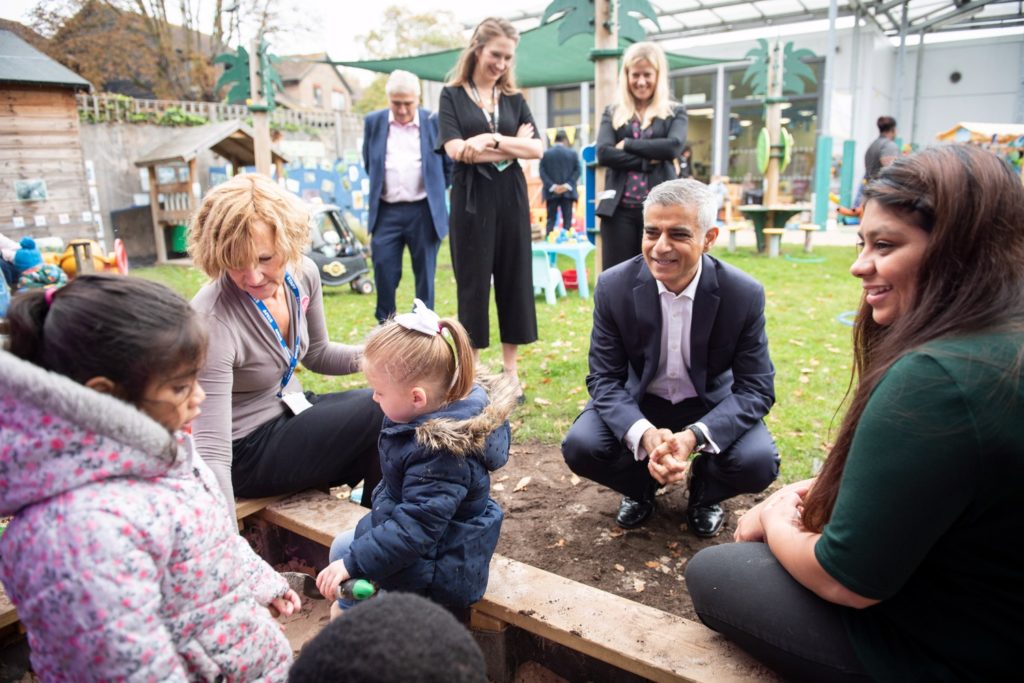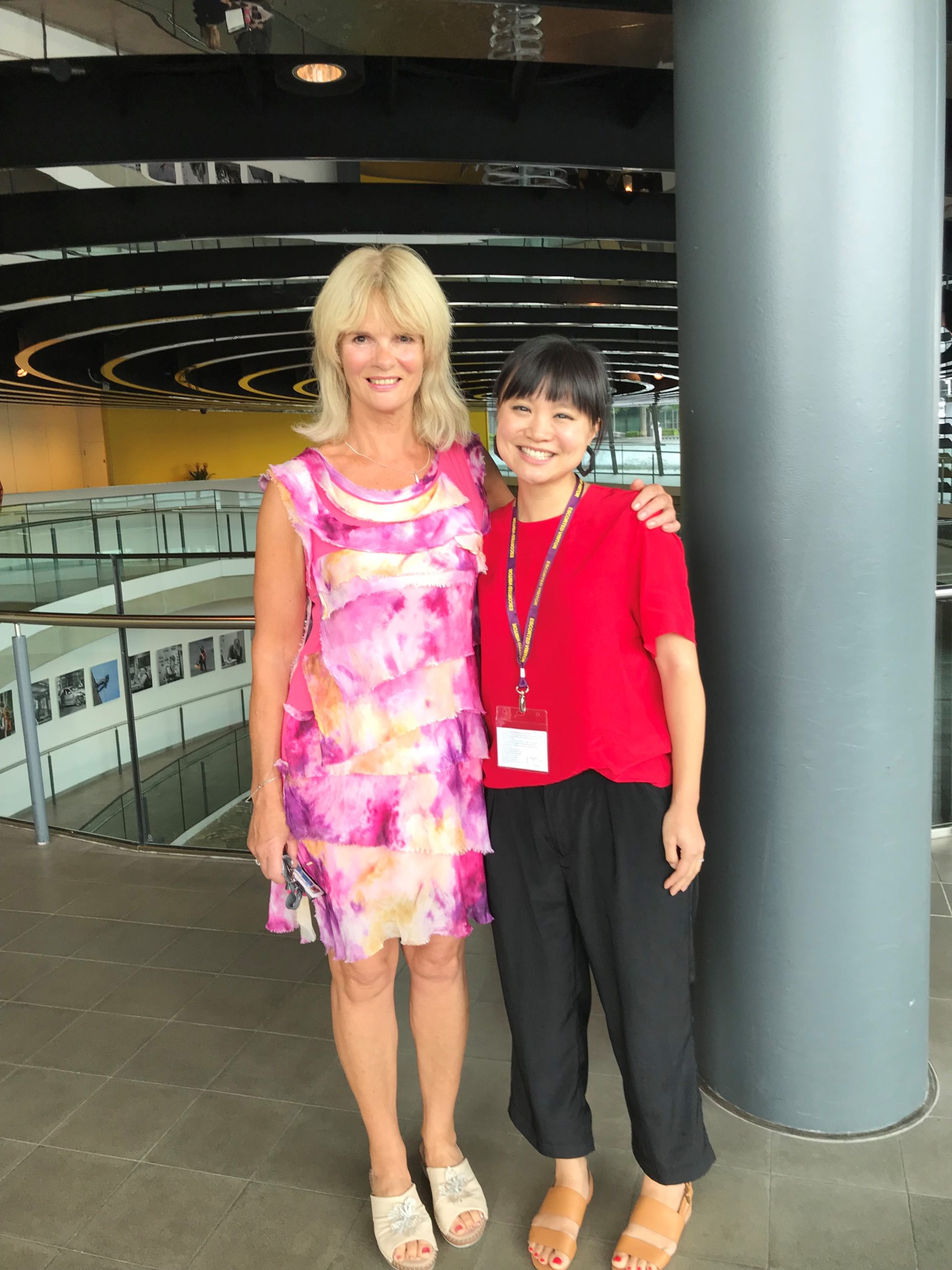By Charity Hung, Deputy Director of the Partnership for Healthy Cities at Vital Strategies (pictured above right with Liz Prosser)
With one in three children leaving primary school in the United Kingdom overweight or living with obesity, improving children’s well-being is a priority. At the city level, London observed a strong relationship between poor diet and lack of physical activity and pediatric health issues. Mayor Sadiq Khan started the Healthy Early Years London (HEYL) initiative in response, which addresses health, education and equality in early child care settings. The initiative aims to equip approximately 300,000 children under 5 years old with a healthy start to life.
No one has been more instrumental to the success of Healthy Early Years London than Liz Prosser, Senior Policy and Programme Officer—Child Health on the initiative’s health team, and technical lead on the components of the program supported by the Partnership for Healthy Cities. As a former educator with a background in physical activity policy, Liz took the lead on HEYL’s design, development and delivery. A recent evaluation funded by the Partnership found that the initiative enjoys strong buy-in among stakeholders, has resulted in policy changes in child care settings and has contributed to the reduction of health inequalities.
On the eve of her retirement, we spoke to Liz about her work developing and scaling up this successful program, her hopes for the future of early childhood health in London, and the impact of COVID-19 on the initiative.
What was the main catalyst for launching the Healthy Early Years London initiative?
Back in 2011 under Mayor Boris Johnson, the London Health Board decided to localize a national healthy schools program for school-age children, which I co-designed. We customized this further with the arrival of Mayor Sadiq Khan in 2016 and launched HEYL through his 2018 Health Inequalities Strategy, a key ambition of which is to give every child in London the best start in life. Looking specifically at the under-5 age range, an investigation I led underscored the need to address health and well-being in education and child care settings.

In those intervening years, between 2016 and 2018, we developed and co-designed Healthy Early Years Londonwith the boroughs of London; 15 of 33 boroughs already had a healthy early years program in place (for children between 0 and 5 years old), so the process demanded a delicate balance that would fit both sets of communities. We are currently reaching nearly 2,000 early years settings across 32 of London’s 33 boroughs, with massive in-kind investment from local professionals and practitioners, which greatly multiplies the amount of program spending by the Greater London Authority. HEYL received accelerated buy-in from local education teams; although the programs are voluntary, they have received almost 100% uptake by local practitioners invited to participate.
What have been some of the challenges and successes in implementing the HEYL programs?
Healthy Early Years London served as a great conduit for bringing together the city’s public health and education services. That is the secret to our success: this is as much an education agenda as it is a health and well-being agenda. Our whole systems approach successfully embeds health and well-being in the culture and ethos of an education and child care setting, and has great potential for adaptation in other localities.
Given the challenges presented by COVID-19, we are currently undertaking a rapid review to understand how the pandemic has affected the HEYL workforce and families, and making determinations on whether we should change the form of the initiative. The community networks formed through HEYL have nevertheless made possible critical awareness outreach on COVID-19 to low-income, high-risk populations. Child care settings and the families whose children attend them have benefited from virtual training sessions covering topics such as bereavement, mental health, anxiety, domestic abuse, childhood stress and physical activity.
“That is the secret to our success: this is as much an education agenda as it is a health and well-being agenda. Our whole systems approach successfully embeds health and well-being in the culture and ethos of an education and child care setting, and has great potential for adaptation in other localities.”
– Liz Prosser, Healthy Early Years London Senior Policy and Programme Officer–Child Health
Do you have a personal connection to child health and well-being? What are you most proud of in your work with the Greater London Authority, both with HEYL and your prior work?
My identical twin sister and I have both dedicated our careers to helping improve children’s health and well-being; she focused on art and I concentrated on physical activity. Decades ago, I developed the national program for exercise instruction, and also served as a physical education teacher and advisor. Even in these roles, so much of my work revolved around children’s mental health and well-being. One of my greatest accomplishments during this time was working with a student with cerebral palsy to enable her to walk down the stairs unaided, which eventually allowed her to star in the local trampoline club. I found that children and young people were really important to me and as I became more involved in early years programming, my passion only grew.
It was a life-changing experience joining the U.K. Department of Health’s obesity team as a delivery manager, where I helped develop the 2011 U.K. Chief Medical Officers’ Physical Activity Guidelines for the under-5’s age group. That was the gateway to my involvement in HEYL. I’ve been so lucky to do what I love in my career.
What are your hopes for how the Greater London Authority will continue to address the intersection of health, education and equality in early child care?
The brilliant thing about early years is that the impact goes beyond the children; we can reach the adult caregivers, staff at child care settings and the parents—all in one place. Focusing on early years also brings together a wide range of health topics under the umbrella of prevention. In meetings on air quality, food security, mental health and immunizations, I have worked to ensure that preventive health measures for our city’s youngest generation are baked into the Greater London Authority’s agenda.
Mayor Khan’s support has been a crucial component of Healthy Early Years London’s success. Listening to my peers in the Partnership in cities across the globe, I believe in the power and influence that a mayor holds. With HEYL, the child care settings value this recognition from city authorities. For example, Mayor Khan has presented at our annual celebration events for the past two years. His continued support will determine the outcomes of early years health programming in the years ahead.
To learn more about Healthy Early Years London, visit: https://www.london.gov.uk/what-we-do/health/healthy-early-years-london
Learn more about the Partnership for Healthy Cities COVID-19 Response: https://cities4health.org/
About the Partnership for Healthy Cities:
The Partnership for Healthy Cities is a prestigious global network of cities committed to saving lives by preventing noncommunicable diseases (NCDs) and injuries. Supported by Bloomberg Philanthropies in partnership with WHO, as well as Vital Strategies, this initiative enables cities around the world to deliver a high-impact policy or programmatic intervention to reduce NCDs and injuries in their communities. For more information, visit: https://partnershipforhealthycities.bloomberg.org/
The Partnership for Healthy Cities COVID-19 Response is part of the $40 million Bloomberg Philanthropies COVID-19 Global Response Initiative. By collaborating with the WHO and Resolve to Save Lives, an initiative of Vital Strategies, the Partnership for Healthy Cities COVID-19 Response is working hand-in-hand with the world’s leading experts on epidemic prevention.
